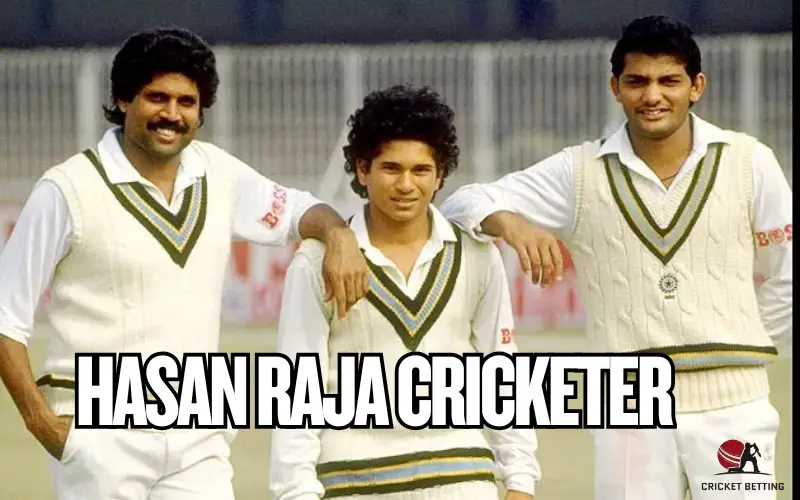Cricket, often referred to as a religion in countries like Pakistan, has produced numerous legends over the years. Among these legends is Hasan Raja, cricket betting a cricketer whose journey is marked by extraordinary talent, significant triumphs, and some controversial moments that have tainted his legacy. In this article, we will delve into the life and career of Hasan Raja, exploring his rise to fame, his contributions to the sport, and the challenges he faced along the way.
Early Life and Background
A Promising Start
Born on June 18, 1972, in Lahore, Pakistan, Hasan Raja showed an early affinity for cricket. Growing up in a cricket-loving nation, he was inspired by the legends of the game and aspired to make his mark. His journey began in local clubs, where he honed his skills and showcased his potential as a talented batsman.
Rise Through the Ranks
Hasan’s talent did not go unnoticed. He quickly progressed through the ranks of junior cricket, representing his school and local teams. His performances in domestic cricket caught the attention of selectors, leading to his inclusion in the Pakistan Under-19 team. This was a crucial step in his career, as it provided him with the platform to showcase his abilities on a larger stage.
International Career
Debut and Early Success
Hasan Raja made his international debut for Pakistan in 1996 during a One Day International (ODI) against Sri Lanka. His entry into the national team was met with high expectations, and he did not disappoint. Raja’s elegant batting style and ability to play under pressure quickly earned him a reputation as a promising talent.
In his early matches, Hasan displayed his prowess as a middle-order batsman, contributing significantly to the team’s success. His ability to anchor innings and accelerate when needed made him a valuable asset to the squad. His performances in the ODI format led to his selection for the Test team, where he continued to impress with his batting skills.
Triumphs on the Field
One of the highlights of Hasan Raja’s career came during the 1999 Cricket World Cup. He played a crucial role in helping Pakistan reach the semi-finals, showcasing his ability to perform on the biggest stage. His innings against New Zealand in the group stage, where he scored a vital 81 runs, was instrumental in securing Pakistan’s place in the knockout rounds.
Hasan’s contributions to the national team extended beyond the World Cup. He was part of the squad that won the Asian Test Championship in 1999, further solidifying his status as a key player in the team. His performances earned him accolades and respect from fans and cricketing experts alike.
The Tainted Trails
Controversies and Challenges
Despite his talent and early success, Hasan Raja’s career was not without its challenges. As he rose to prominence, he faced scrutiny and criticism, particularly regarding his consistency and performance under pressure. While he had moments of brilliance, there were also instances where he failed to deliver in crucial matches, leading to questions about his temperament.
One of the most significant controversies surrounding Hasan Raja was his involvement in a match-fixing scandal that rocked the cricketing world in the late 1990s. Allegations surfaced that several players, including Raja, were involved in corrupt practices, leading to investigations by cricketing authorities. Although Hasan denied any wrongdoing, the scandal tarnished the reputation of many players and cast a shadow over the sport.
Struggles with Form
Following the match-fixing allegations, Hasan Raja’s form began to decline. The pressure of public scrutiny and the weight of expectations took a toll on his performance. He struggled to replicate his earlier success, leading to his eventual exclusion from the national team. This period of struggle was difficult for Raja, as he grappled with the consequences of the controversies surrounding him.
Life After Cricket
Transition to Coaching
After retiring from international cricket, Hasan Raja shifted his focus to coaching and mentoring young cricketers. He recognized the importance of nurturing talent and giving back to the sport that had given him so much. Raja took on coaching roles at various cricket academies, where he aimed to inspire the next generation of players.
His experience and knowledge of the game made him a valuable asset in coaching roles. He emphasized the importance of discipline, hard work, and integrity, hoping to instill these values in aspiring cricketers. Raja’s transition to coaching allowed him to remain connected to the sport while helping others achieve their dreams.
Advocacy for Clean Cricket
In the wake of the match-fixing scandal, Hasan Raja became an advocate for clean cricket. He spoke out against corruption in the sport and emphasized the need for transparency and integrity. Raja’s experiences served as a cautionary tale, and he used his platform to raise awareness about the importance of fair play.
His advocacy efforts included participating in seminars and workshops aimed at educating young players about the dangers of corruption and the significance of maintaining the integrity of the game. Raja’s commitment to promoting clean cricket demonstrated his desire to contribute positively to the sport.

Legacy and Impact
A Complex Legacy
Hasan Raja’s legacy is a complex one. On one hand, he is remembered for his exceptional talent and contributions to the Pakistan cricket team during his prime. His performances in crucial matches and his role in significant victories are etched in the memories of fans. On the other hand, the controversies and challenges he faced have left a lasting impact on his reputation.
While some may view him as a cautionary tale of talent marred by controversy, others see him as a symbol of resilience and redemption. His journey reflects the highs and lows of a cricketer’s life, showcasing the challenges that come with fame and success.
Inspiring Future Generations
Despite the challenges he faced, Hasan Raja’s story serves as an inspiration for aspiring cricketers. His journey highlights the importance of perseverance, hard work, and integrity in the face of adversity. Young players can learn valuable lessons from his experiences, understanding that success is not solely defined by accolades but also by how one navigates challenges.
Raja’s commitment to coaching and advocating for clean cricket further solidifies his role as a mentor for future generations. By sharing his knowledge and experiences, he aims to guide young cricketers on their paths to success while emphasizing the importance of ethical conduct in the sport.
Conclusion
Hasan Raja’s journey in the world of cricket is a testament to the complexities of talent, triumph, and the challenges that can arise along the way. From his early days as a promising young cricketer to his involvement in controversies and his eventual transition to coaching, Raja’s story is one of resilience and redemption.
As cricket continues to evolve, the lessons learned from Hasan Raja’s experiences remain relevant. His advocacy for clean cricket and dedication to mentoring young players serve as a reminder of the values that should underpin the sport. While his legacy may be multifaceted, it ultimately reflects the enduring spirit of cricket and the potential for growth and redemption in the face of adversity.






